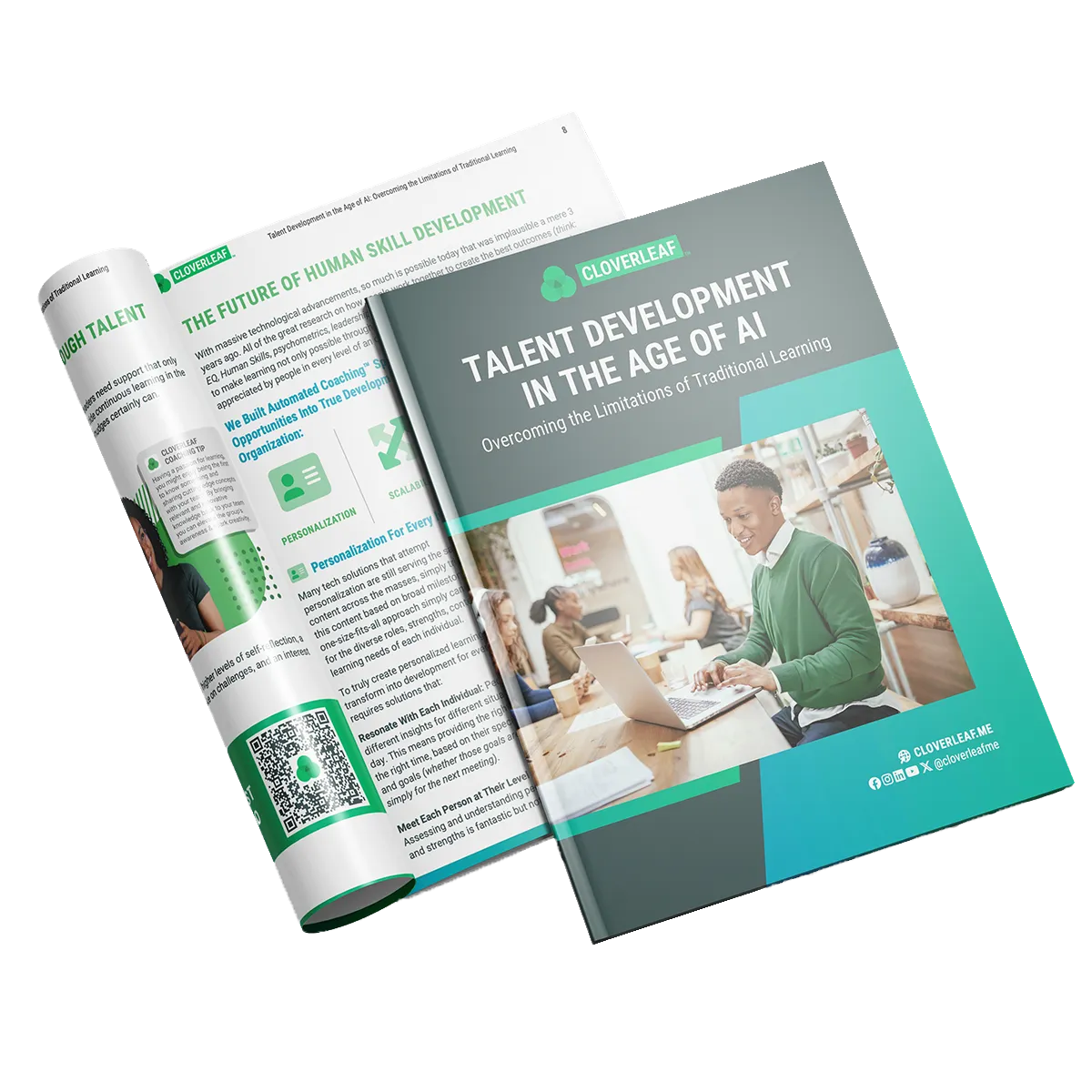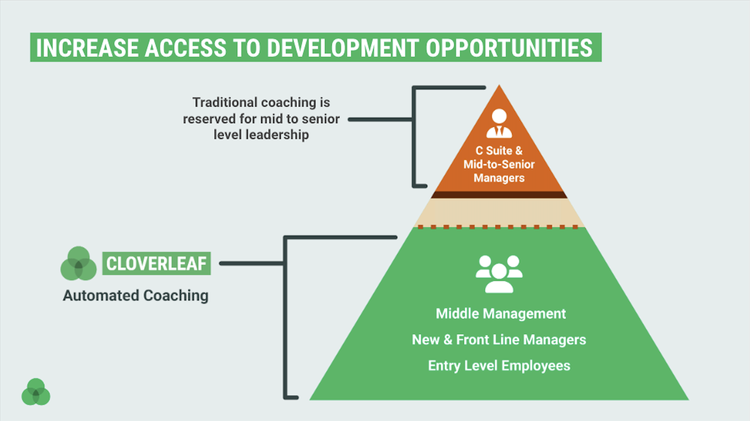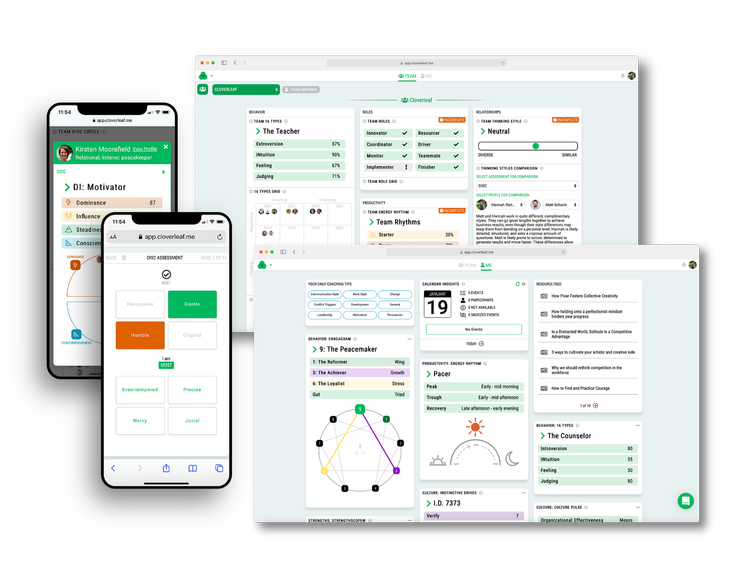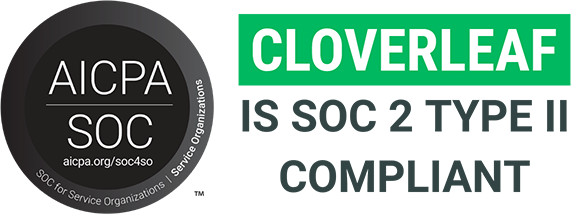In today’s rapidly evolving workplace, businesses constantly strive to improve employee performance and foster a motivating coaching culture. One emerging trend in achieving this goal is the use of Automated Coaching.
But why is Automated Coaching™ so valuable? As businesses aim to provide targeted and impactful coaching, they face challenges in developing effective training programs tailored to employees’ needs.
By leveraging data-driven insights and personalized coaching, organizations and teams can effectively identify skills gaps, develop tailored training programs, and drive learning and development initiatives aligning with organizational goals.
Let’s dive into what Automated Coaching™ is and discover why it’s quickly becoming an essential component of leadership development in the modern workplace.
Key Takeaways:
- Despite numerous L&D initiatives, employee behavior is only modestly impacted.
- Optimized learning occurs when the experience is customized, integrated into the workflow, and available on demand.
- Automated Coaching™ offers relevant, real-time prompts for improved emotional intelligence, communication, collaboration, and conflict resolution.
- Employees require smaller, well-timed insights that can be processed and applied daily for growth.
- Automated Coaching™ can scale to provide development opportunities for all employees.
The Problem with Traditional Learning and Development Initiatives
Leadership and development (L&D)—the process of helping employees increase performance and well-being in organizational settings—is a $366B industry. L&D is everywhere, with larger organizations having in-house L&D departments/positions, Universities offering L&D-specific degrees (e.g., master’s degrees, executive education), dozens of the world’s largest consulting firms specializing in L&D offerings, and hundreds of thousands of small businesses and solopreneurs engaging in L&D through individual and team-based coaching and consulting.
The problem, however, is that despite the sheer magnitude of L&D interest and initiatives, meta-analytic evidence suggests that its impact on employee behavior is relatively modest.
The source of the issue is that learning and development typically manifest as a one-time initiative where participants are inundated with recommendations. This approach is misaligned with the fact that human beings can only process and retain a limited amount of information in one setting. Further, L&D is typically delivered as a pre-packaged and static offering, which overlooks that individuals are different and that their priorities, careers, and lives are constantly in flux.
Research suggests that learning and behavior regulation are optimized when the experience is customized to users’ characteristics and needs, integrated within one’s workflow, and available on demand. Human beings can’t accommodate these features at scale, but technology certainly can. This is where Automated Coaching™ can make a substantial impact.

HUMAN SKILL PROGRAMS ARE HITTING LIMITATIONS...
- Close the widening gap between learning and on-the-job application
- Overcome the tension of pausing productivity for development opportunities
- Integrate learning so it is actually in the flow of work
- The evolution of human skill development
- What Automated Coaching™ is and how it works.
Automated Coaching: The Evolution in Self-Directed Growth and Development
Traditional coaching entails the dyadic relationship between coach and coachees, which involves a process of collaborative goal-setting, constructing solutions, and fostering the coachee’s self-directed growth.
With Automated Coaching™, the goal is pre-defined (i.e., enhancing self-awareness and other-awareness), and the automated coaching system generates solutions that foster the coachee’s self-directed growth. In turn, Automated Coaching™ provides relevant, in-the-moment prompting and insight that individuals can directly apply to increase emotional intelligence, strengthen communication, identify opportunities for collaboration, and work through conflict successfully with teammates.
Cloverleaf uses assessment data to provide digital nudges to everyone within a team or organization to improve performance, increase managerial effectiveness, strengthen cross-functional collaboration, and inspire personal development.
A consolidated dashboard provides insights into employee strengths, weaknesses, and areas for improvement. From validated personality and strengths assessments to daily coaching, this approach can help organizations improve collaboration, strengthen performance, and better understand the needs of their teams.
How Automated Coaching™ is Revolutionizing Daily Growth and Development in the Workplace
One of the advantages of Automated Coaching™ is that it can be “pulled” at the coachees’ convenience and that it can be “pushed” every day, as many times as the system is programmed. Thus, unlike other L&D opportunities, Automated Coaching™ can facilitate coachee growth on a day-to-day basis. This approach aligns with several theories in organizational behavior.
First, according to social learning theory, human beings can only attend to, process, and retain a limited amount of information. Said differently, people can’t internalize information like super-computers. If organizations want their employees to grow, they must deliver smaller, digestible, well-timed insights that they can process and apply daily.
Second, research is being conducted in clinical psychology on using “micro-interventions”–small and short interventions void of human contact–that help patients with anything from anxiety to addiction.
These microlearning interventions align with what’s called metacognitive prompt theory, which suggests that you can nudge people to be more aware of their situation through purposeful reflection, which leads to more heightened self-regulation and behavior change.
Cloverleaf has researched this phenomenon, and the results are promising. The extent to which users engaged with the automated coaching program positively impacted several important outcomes, including an enhanced desire to learn more about themselves and their work, improved interactions with team members, and an overall better mood while at work.
Will Automated Coaching™ Replace Or Support Traditional Coaching Practices?

Automated Coaching™ will supplement, not replace, traditional coaching. Prior research illustrates that, when done well, coaching increases coachee performance and well-being.
Automated Coaching™ give coaches a more efficient method for staying connected with their coachees. It also gives them richer material to discuss with their coachees. In an ideal world, employees have access to both.
Unfortunately, many don’t experience the benefits of coaching, given the cost, lack of access, or time commitment. Technology can help close this gap by lowering costs and making coaching more scalable and widely available to diverse groups.
Is Automated Coaching™ The Same Thing As Artificial Intelligence?
Automated Coaching™ is broader than artificial intelligence (AI). However, where appropriate, AI can play a fundamental role in helping make Automated Coaching™ more adaptive and impactful.
We are far from “strong AI,” whereby machines are fully autonomous with general intelligence. Indeed, AI is making substantial process over the last decade, making it easier for organizations to incorporate into products like Automated Coaching™. However, applying “weak AI,” whereby specific algorithms are embedded to solve particular problems, is more representative of what coaching and Automated Coaching™ have the potential to incorporate in the short term.
How Can Leaders Rethink What's Possible With Coaching for Today's Workplace
Traditional coaching strategies have shortcomings that can be felt across an organization. However, scaling the development of team members is more tangible today.
As outlined here, there are four significant challenges to traditional coaching models that hinder their effectiveness in the workplace:
- It is often limited to the coachee’s perspective
- Providing a human coach is costly
- Relevance and timeliness are limited due to scheduling
- Proving impact that affects organizational results
As such, innovation is needed to address these challenges related to organizational training and development. Automated Coaching™ overcomes the challenges leaders are familiar with in delivering coaching to their employees.
Automated Coaching Is:
- Scalable
- Timely
- Measurable

Unlike traditional coaching models, Automated Coaching™ can scale to increase access to development opportunities for everyone in an organization. This means that employee coaching is no longer limited to a select few but can widely extend throughout a company.
What’s more, Automated Coaching™ provides employees with a greater number of coaching moments than traditional practices. Instead of relying on monthly sessions where individuals hopefully gather a handful of understanding, Automated Coaching™ integrates into the user’s workday to offer in-the-moment, relevant insights and tips.
Additionally, Automated Coaching™ offers a unique advantage in the form of user feedback, allowing individuals to provide input on the coaching tips they receive. This immediate feedback response enables users to obtain better insights and more applicable coaching tailored to their specific growth. Therefore, Automated Coaching™ can adapt to the needs of each individual, making it a powerful tool for employee development and organizational performance.
Final Thoughts
As businesses seek new ways to streamline training and deliver impactful coaching, Automated Coaching™ provides a unique solution. With the ability to adapt to the specific needs of individuals, it is a powerful tool for employee development and organizational performance.
The future of leadership development lies in this customized, on-demand coaching that can enhance skills and increase performance, transforming the workplace for years to come.




